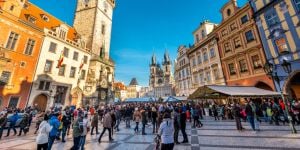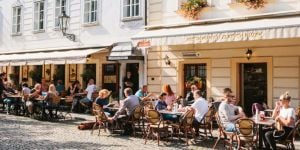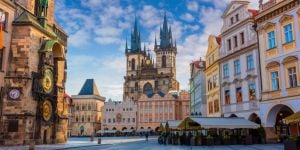Winter tip toes into the year during the Advent season hardly noticed mist the flurry of Christmas preparation. When we finally realize that the Winter Solstice has past we are assured that the darkest day of the year is behind us knowing that each day will bring a few minutes more of light. By now our focus is on the celebration of Christmas. Greens are placed on window sills. Wreaths are hung on doors. The tree is decorated and our Bethlehem or Creche is set up on a table in the living room. Each day is full of activity, every minute of the day is busy. Shopping, baking, house cleaning. We move around like an army of ants getting ready for the holiday season. Then Christmas day arrives and is over before we realize it. The lull between Christmas and New Year is welcomed by all. Most of us take off from work the seven days between Christmas and New Years. If there is snow around our village, we cross-country ski. Many people go to the surrounding mountains to sk
Winter in the Czech Republic
Three Kings day on January 6 signifies the 12th day of Christmas and the end of the season. Young boys dressed in white robes with crowns on their heads visit houses to collect money for charity. Many of the boys come from religious organizations armed with special chalk that has been blessed by the church. When a donation is given the boys mark the top of the front door of houses with K + M + B and the date, which stands for Christus mansionem benedicat(Christ bless this house). Ending the Christmas season we pack away our decorations till next year.
January and February are the coldest months of the year. Snow usually blankets the world around us. Getting around becomes more difficult. We can look forward to getting up early to shovel snow from the walkways and drive after each new snow fall. Week-ends are spent at home or if the weather is nice, out in the fields skiing cross-country from village to village and from pub to pub, where you can buy a bowl of hot soup and a mug of beer to fortify you a little.
Masopust is celebrated some time in February. Masopust meaning 'meat fast', traditionally the last chance to eat meat before Ash Wednesday, the beginning of Lent. Although in the middle of winter Masopust is celebrated outdoors. This carnival tradition has been passed down from generation to generation. Elaborate costumes are worn by villagers with mask to hide their identity. Each character has significance and symbolism. Some of the most popular are devils, chimney sweeps, cow herders, ring masters, butchers, bears, goats, pigs, chickens or a horse. While noisily singing, shouting and dancing, the costumed characters make their way from house to house, where they're treated to food and drink. Followed by crowds of onlookers the procession usually ends in the pub, where the eating, drinking and merrymaking often continue until morning.
By the end of February the days begin to be longer and warmer. We plant seeds in trays, leaving them on the window sill to sprout. In March the first daffodil start to poke up through the receding snow. Forsythia begins to show their yellow buds. Snow Bells push their little whites heads up from their winter beds. Pussy Willows begin to swell on their branches. The frozen earth begins to thaw. With a sharp spike I hollow holes in the garden to plant rows of English Peas. As the ground becomes workable we plant lettuce and cool weather greens and start to prepare the beds for spring plating.
In our kitchen the winter season is a time for hearty soups, meat, potatoes and sauerkraut. During the cold weather we feel the need to eat more protein and more substantial food. The season leading up to Christmas is especially busy preparing traditional dishes and sweets. I serve a turkey or fresh ham stuffed with dressing for Christmas dinner along with potatoes and vegetables from our garden. The Czechs eat carp and potato salad as their traditional Christmas meal. In winter we start to enjoy the provisions we have put away in our cellar from the previous summer. We bring out our prosciutto crudo and cut the first thin slices for Christmas. We sample the first new wines. We enjoy the canned fruits and vegetables. My husband especially enjoys our pickles. We smear homemade jams and jellies on our toast in the morning and eat spicy chutney with meat. On New Year's Eve we have lentils and sausages for good luck. We buy oranges, grapefruits and tangerines from the supermarket. I make apple pies and strudel with our garden apples which we have stored away for winter. Cooked beets appear on our table served hot or cold they are delicious with olive oil and wine vinegar. I have wonderful wine vinegar which I made myself and now has aged for 9 years in the cellar. Each year another batch is made and allowed to age before using.
Winter is not my favorite time of year, it is cold and dark. Non the less, if we didn't have winter, we wouldn't enjoy Christmas, New Year's Eve or Masopust, all events worth celebrating. We wouldn't enjoy the days of skiing across new fallen snow. We wouldn't be able to marvel at the beauty of a bright frosty morning when all the trees are covered with ice crystals, glistening in the sun like diamond covered jewelry. Or drink hot chocolate in our warm living room while watching snow flakes fall past our window.
source: lien
We do our best to provide accurate and up to date information. However, if you have noticed any inaccuracies in this article, please let us know in the comments section below.













